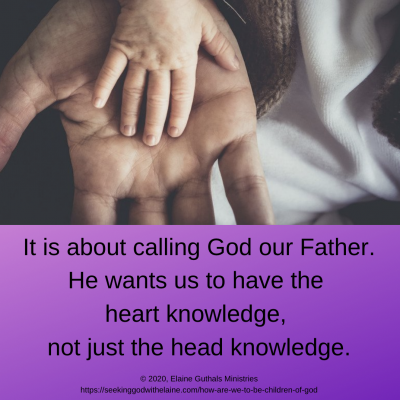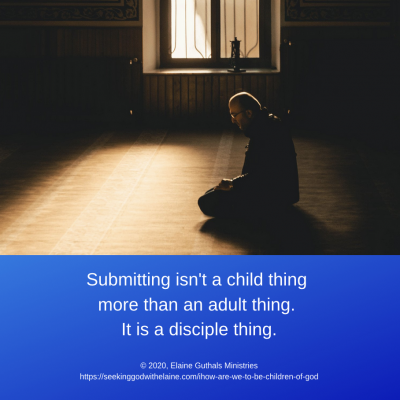In answering the disciples’ question, Jesus told them that they needed to have an attitude of a child. This devotion looks at the characteristics of children so that we can emulate them when depending on our Heavenly Father.
Nuggets
- Places a dependence on God is complex.
- Competence speaks to having the relationships that God wants us to have with Him.
- We have to believe beyond a shadow of a doubt that what God is telling us is true.
- Disciples need to not only be connected to God, but we also have to be connected with each other.
- Building the character of God is what being a disciple is all about.
- God has a job for each one of us to do.
- God helps us cope in those times of trials.
- We do have to control ourselves and our sinful nature, but it is more about God being in total control.
How Are We to be Children of God?

Let's Put It into Context #1
Family is, according to the Holman Bible Dictionary, “the basic household unit which provides a person’s central relationships, nurture, and support.”
Resource
Let's Put It into Context #2
“At that time the disciples came to Jesus and asked, ‘So who is greatest in the kingdom of heaven?’” (Mt. 18: 1 CSB)
I wonder what the disciples were really asking Jesus when they asked, “… ‘So who is greatest in the kingdom of heaven?’” (Mt. 18: 1 CSB). Asked in the correct way, we could make an argument that there was nothing wrong with the question. If we are asking it to grow closer to God, that is exactly what God wants.
At least some of the disciples were looking for the military Messiah. If they were asking based on a military assumption, they were heading down the wrong path.
We know the disciples really didn’t get what the kingdom of God was. They didn’t get that it is eternal or that it is within us in our hearts.
I think Jesus was addressing ambition here. No, I don’t think He was telling us we shouldn’t try to improve ourselves. We know we are to grow in grace and knowledge (II Pet. 3: 18).
Jesus was always focused on the spiritual. God wants us to focus more on the spiritual than the physical. The disciples were asking the question wrong.
It is probably a pretty safe bet that the disciples did not expect Jesus’ answer. Jesus was good at saying the unexpected.
The Answer
“He called a small child and had him stand among them. ‘Truly I tell you,’ he said, ‘unless you turn and become like little children, you will never enter the kingdom of heaven. Therefore, whoever humbles himself like this child — this one is the greatest in the kingdom of heaven. And whoever welcomes one child like this in my name welcomes me’” (Mt. 18: 2-5 CSB)
Sometimes we think we know the answer. It is a simple “be humble like a child” admonition. Humility is a character trait that diminishes pride and places dependence on God while holding a modest view of our importance with respect to others.
But places a dependence on God is complex. How are we to place a child-like dependence on God?
I looked up a list of characteristics of children. I found a couple of teach-your-children-this lists.
I was looking for more of a children-are-this list. The closest thing that I found is a resilient-children-are-this list. It is Mead’s 7 Key Characteristics of Resilient Children. It works.
Resource
Competence
Competence means we know how to do something or have the skills to do it. When we apply it to what Jesus was talking about, we know God.
That speaks to having the relationships that God wants us to have with Him. It isn’t just about the head knowledge or the ritual of religion.
It is about calling God our Father. He wants us to have the heart knowledge, not just the head knowledge.

Confidence
Confidence is about having certainty in something. In churchy words, we say we believe in God. We have to have faith and trust.
Faith is the belief that the doctrines stated in God’s Word are true, even if we do not understand all aspects of them. Trust is assurance that the promises of God are true.
Assurance is another good word. It talks about certainty, too.
Assurance leads to hope. Hope is where we desire for something that we believe is obtainable.
We have to believe beyond a shadow of a doubt that what God is telling us is true. If He says we are spiritually dead if we haven’t ABCDed and that means we are going to be spending eternity in hell, that is what we have to believe. If He tells us that He wants us to put the devotions we’ve been writing online so others can read them, we have to have the confidence to do that — even if we are shaking in out boots the whole way.
The ABCDs of Salvation
If you have not become a believer in Christ, please read through the
Plan of Salvation and prayerfully consider what God is asking you to do.
A – admit our sins
B – believe His Son Jesus is our Redeemer
C – confess God as Sovereign Lord
D – demonstrate that commitment by making any changes needed in our lives to
live the way in which God has called us
The Disciple’s Job Description
Connected
Disciples need to not only be connected to God, but we also have to be connected with each other. God has built a community of believers. We aren’t supposed to be insulated.
Resource
But it isn’t just a fellowship thing. We have a job to do.
- “And he said to them, ‘Go into all the world and proclaim the gospel to the whole creation’” (Mk. 16: 15 ESV).
- “Go therefore and make disciples of all nations, baptizing them in the name of the Father and of the Son and of the Holy Spirit, teaching them to observe all that I have commanded you. And behold, I am with you always, to the end of the age” (Mt. 28: 19-20 ESV).
We are to support others. We just said in a recent devotion that disciples provide charity to widows when needed. Charity means showing others love flavored with acts of benevolence.
Character
Building the character of God is what being a disciple is all about. That is why we are on the sanctification road.
Sanctification is the transformation of mind, body, and soul beginning with regeneration and ending with perfected state of spiritual wholeness or completeness. Regeneration is the change in us that God brings about when we go from being spiritually dead to spiritually alive. The perfected state indicates spiritual wholeness or completeness.
We are to have the disposition of a child. Our disposition is our temperamental makeup.
Oh, yeah. That means change.
Jesus was all about our need to change. That is what conversion is. Conversion is a change of mind, heart, and conduct. We have to have this change to enter the kingdom of God.
Resource
Sanctification is a process. Pool said it the best when he wrote “that even converted souls have need of a daily conversion.”
Resource
What Jesus was getting at was we need to be trusting and submissive rather than ambitious. That is what we need to turn toward in repentance.
Glossary
Contributors
God didn’t call us to be back-seat Baptists. He wants us to contribute. He has a job for each one of us to do.
That is why the Great Commission has all of those action words (Mt. 28: 19-20).
- Go
- Make
- Baptize
- Teach
God knows that the only way we are going to truly understand some of His ways are by doing them. We have to put them into practice.
Cope
Oh, yeah. Being a disciple is not going to be easy. Satan is going to throw all he has at us because he wants to derail us.
But God helps us cope in those times of trials. We have to know that He is our protector in times of trouble.
- “There is no one holy like the LORD. There is no one besides you! And there is no rock like our God” (I Sam. 2: 2 CSB).
- “The Lord is my rock, my fortress, and my deliverer, my God, my rock where I seek refuge, my shield and the horn of my salvation, my stronghold” (Ps. 18: 2 CSB).
- “He will cover you with his feathers; you will take refuge under his wings. His faithfulness will be a protective shield” (Ps. 91: 4 CSB).
The thing is, God doesn’t want us to go it alone. He wants us to depend on Him for everything — the big stuff and the little stuff.

Control
That is a good segue to the next topic. We talked at the beginning of the year that I thought about making self-control my word for the year. It is a fruit of the spirit.
We do have to control ourselves and our sinful nature. We do that through self-discipline.
But we can’t just think we are in control. Remember, God told me, “Well, Chick, you can’t do self-discipline without Me.”
It is more about God being in total control. We have to submit to Him.
Oh, yeah. We think submitting is more of a child thing than an adult thing. But it isn’t. It is a disciple thing.

Making the Connections
We have said before that repentance was turning from sin. Now we know what we are to turn toward — a child-like disposition.
Don’t worry. Nicodemus had trouble with this you-must-be-born-again/become-a-child directive.
Paul really didn’t explain it much better to some peoples’ estimation. “Therefore, if anyone is in Christ, he is a new creation. The old has passed away; behold, the new has come” (II Cor. 5: 17 ESV). How can be brand new?
Vaughan helped us understand. He wrote, “This image does not convey the idea of a perfectly new being, but of an old being begun again, that it may do better.”
Resource
With all of the C words up there, we need to add a D Word. We need to be docile. Docile means easily taught.
Jay noted that we should “not [be] like them in ignorance, not in fickleness, not in waywardness.” We should be willing to be taught and changed.
Resource
Making the Connections to Self-Discipline
Submission is a bad enough word to some worldview people. When we tell them child-like, they may turn around and walk away. How do we describe what God is wanting us to be?
We’ve been looking at defending our beliefs when we are witnessing. That means we have to be secure enough to convince someone to accept our beliefs.
Our questions should still serve us to determine on what we need to focus.
- What does the Scriptures say?
- What do I believe?
- Why do I believe the same/differently than the Scriptures?
- What are the talking points when witnessing to a non-believer?
Related Links
I have created a worksheet of the questions above. Click on the button below to access it.
How Do We Apply This?
We have to understand that the resistance is in us, not just the worldview people. Vaughan wrote, “We as men fancy ourselves independent and self-sufficient; we must get back to simplicities, self-renunciation, to a babyhood of trust.”
Resource
How do we know that we have become child-like? In Jay and Various’ Conversion, it was written, “The change is to be judged of by its effect.” Have we become more dependent on God?
Resource
Oh, yes. We have to discuss the elephant in the room. We have to be ready for the discipline for when we mess up. Isn’t that what children do? They push the boundaries or just plain get it wrong — and have to face the consequences.
Now we know what we are turning to when we turn away from repentance. We just have to do it.
Father. We come to You as our Father. We come to You as Your children. That means we come in humility and submission. Grow us to be who You want us to be. Refine us until our character matches Yours. Sustain us on this sanctification road and help us to reach our end destination — being perfected in Your sight. Amen.
What do you think?
Leave me a comment below (about this or anything else) or head over to my Facebook group for some interactive discussion.
If you don’t understand something and would like further clarification, please contact me.
If you have not signed up for the email daily or weekly providing the link to the devotions and the newsletter, do so below.
If God has used this devotion to speak with you, consider sharing it on social media.